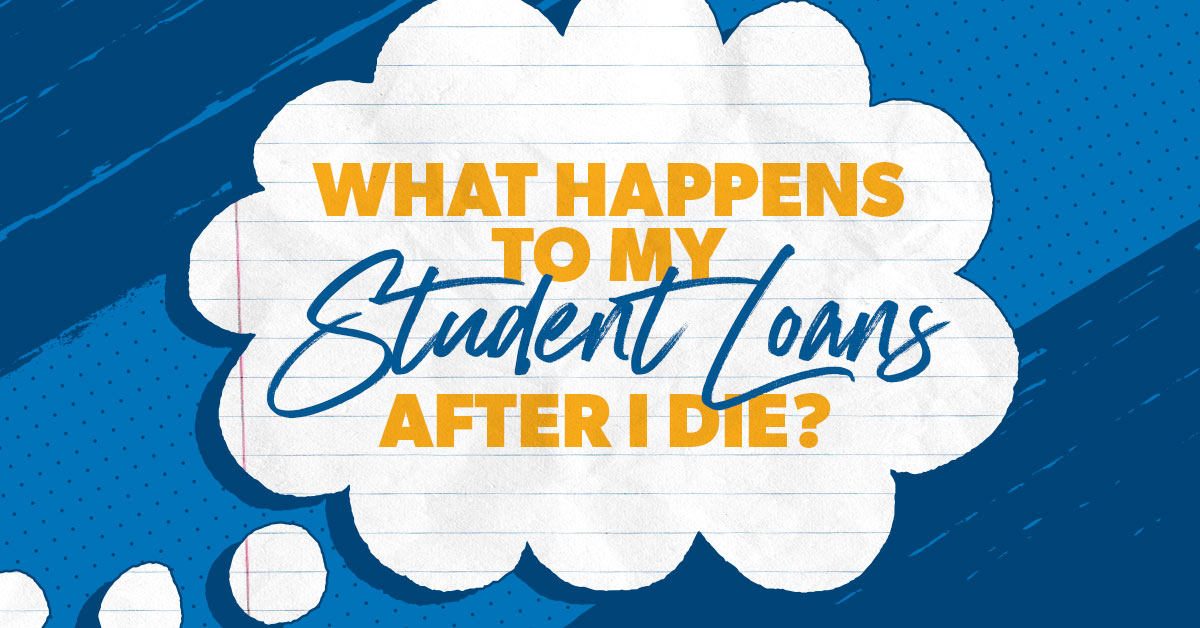What Happens to Student Loans When You Die
4 Min Read | Jun 28, 2022

When you’ve got student loans, sometimes it seems like they’ll never go away. But just like us, student loans won’t be around forever.
What happens to your student loans when you die depends on a few things—what kind of loan you have, when you took out the loan and the lender’s agreement. We’re going to touch on all of that and more, so you know if the debt will pass on with you or if it’ll continue to haunt your grieving loved ones.
What Happens to Federal Student Loans When You Die?
If you have federal student loans at the time of death, they’ll be discharged (aka the loan is forgiven). Surviving relatives will simply need to present an original death certificate to make it official.
What Happens to Private Student Loans When You Die?
Unlike the government, private lenders aren’t required to discharge student loans when someone dies. This means that the way lenders handle a borrower’s death can vary widely, and you’ll need to check your policy.
Some private student loans will discharge the debt once it’s proven that the borrower is deceased. A copy of the death certificate can serve as proof.
But other lenders may seize the deceased person’s estate to pay off the debt. They can only take what’s in that person’s name—bank accounts, cars, property, etc. If that’s not enough to cover the debt, then it simply remains unpaid. End of story.
The law also states that all private student loans taken out after Nov. 20, 2018, must release the cosigner(s) if the borrower dies.1 But even if the loan is older than that date, the lender may still offer forgiveness.
This is great news, since cosigners are legally responsible to pay off things like mortgages, car loans and other debt after the borrower dies. And that’s why you never want to cosign anyone’s loan, ever.
What Happens to Parent PLUS Loans When You Die?
Parent PLUS loans are discharged if the parent or student dies. Just like with federal loans, you’ll need to submit proof that one of the borrowers has died.
Tax Implications of Dying With Student Loans
As for taxes, student loans are exempt if they’re forgiven or discharged because of death. That’s all thanks to the Tax Cuts and Jobs Act of 2017. And it’ll stay in effect at least until 2025.
Student Loans and Suicide
The United States is in a student loan crisis. And it’s not just taking a toll on our finances, it’s taking a toll on our mental health.
The Community Mental Health Journal did a study of students. And of that group, 15.5% of those in debt had a mental health disorder, while only 8.9% of those without debt had a mental health disorder.2 That’s sobering evidence of the negative effect debt is having on our graduates.
But suicide is not the answer. First of all, it may seem like you’d be doing your family a favor, but no amount of erased debt can fill the void that your absence would create. Second, while paying off your student loan debt can seem impossible, it’s well within your realm of possibility. You can pay off your student loans fast. It won’t be a cake walk. But it’ll be one of the most liberating and empowering things you’ll ever do.
If you are feeling suicidal, please call the National Suicide Prevention Lifeline at 1-800-273-8255 or text HOME to 741741.
What to Do About Your Student Loans Now
As long as you’re drawing breath, you can do something about your student loans. And if you know someone with student loans who has died, start with contacting their student loan service provider to address the debt. We also created a helpful checklist to follow in case someone dies.
Ready to get rid of your student loans once and for all? Get our guide.
If you’re facing a terminal illness, you can apply for a terminal and permanent disability discharge (TPD), which will forgive your loans. You’ll need to present a physician’s certification that your illness is expected to result in death, that you’ve been seriously ill or are expected to be seriously ill for the next 60 months.3
If you’re healthy, attack your debt by making more than the minimum payment and serve Sallie Mae her eviction notice. You can do it! Currently, student loan payments are on pause until Sept. 30, 2021.4 You can make some major headway paying down your principal balance in that time.
You may also want to consider refinancing your loans in exchange for a lower interest rate. Variable rates can send your student loan payment sky-high over time. Check out our trusted service for student loan refinancing.
And for the step-by-step plan to pay off your student loans fast, check out Anthony ONeal’s Quick Read Destroy Your Student Loan Debt.


